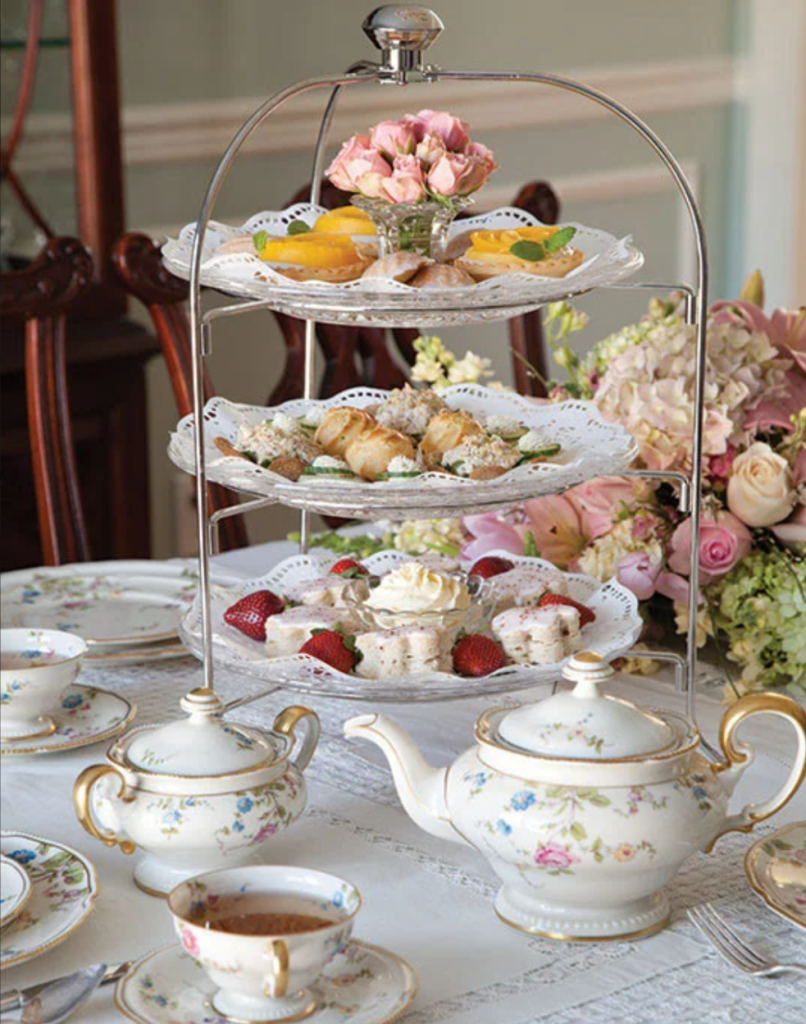
As some of you may know, I set out to write Celestial Persuasion when I came across this painting of Mariquita Sanchez de Thompson. This scene depicts the moment when the Argentine national anthem was sung for the very first time.
The image of ladies and gentlemen in Regency attire was far from what I had expected to find in colonial Argentina. To tell the truth, I would have expected full crinoline skirts and impressive peinetas, such as we find in the satirical work of Cesar Hipolito Bacle.

By delving into the aftermath of the May Revolution of 1810, I discovered that the aristocracy of Buenos Aires was more inclined to follow the fashion trends of Paris or even London. The influence coming from across the pond was not to be denied!
I began connecting the dots and weaved a tale that included English noblemen and naval officers, along with the liberator of Spanish America: Jose de San Martin. Establishing a friendship in between Jane Austen’s Captain Wentworth and my own fictional character, Jonathan Isaacs, was the next step in the process.
Next, I began looking to incorporate that bit of yiddishkeit that is so crucial to my work. For example, I wanted to ensure that the Jewish holidays mentioned throughout the novel occurred in accordance to the Hebrew calendar. In the prologue, Abigail Isaacs writes to her brother, describing their father’s passing—just prior to his favorite holiday: Pesach (Passover).
I must assume that you have not received my news from home, and knowing how you are impatient with all but the essentials, allow me to put it to you in words so familiar they could be your own: our dear papa died on March 26th on the eve of Rosh Chodesh—sadly a little more than a week before his favorite holiday. He had been looking forward to leading the Passover seder this year; but then again, he had been unwell for several months and refused to change his habits.
Rosh Chodesh is mentioned several times throughout the novel, as are other holidays, such as the High Holy Days and Chanukah. I suppose I could have picked any date when these events “usually” occur; but it was important to be accurate, particularly when it came to a certain battle that took place on February 3, 1813. Hopefully, the following snippet helps to explain…
“San Martín plans to engage with a Spanish royalist force in one month’s time,” he muttered beneath his breath. “When do you expect to travel to witness your monumental natural event?”
She grimaced at the small sound emitting from her lips. “I must be in residence at the beginning of the month, though I do not believe it is any of your concern.” Rethinking her statement, Abigail’s voice grew with enthusiasm. “Mr. Gabay!” she exclaimed, “has he chosen the exact date?”
“You cannot imagine that I would share that information, Miss Isaacs.”
Vehemently she shook her head. “I care not for your confidences, at least for the reasons you may suspect. I only ask that you heed me, sir. I must be in Rosario for Rosh Chodesh. There will be a new moon on the first of February. The night’s sky will be sufficiently darkened to allow for maximum visibility of galactic activity. Do you understand my meaning?”

The Battle of San Lorenzo was a turning point for the rebels fighting the Spanish crown. If I wanted to showcase the event in my story—and have it coincide with Rosh Chodesh—it had to be… kosher. I knew I had to get it right! First, I researched the status of the moon phase in February 1813. I found that information here and here. Then, I checked to see if the Gregorian calendar aligned with the Hebrew calendar. I found that here and here. It worked out!
Throughout the story, we follow Abigail as she celebrates Shabbat and Havdalah. Granted, her family is no longer as pious as when her mother lived. Nevertheless, when Abigail is called to London to meet Lord Fife, she ensures to take her ritual items. And when she and Mrs. Frankel find themselves aboard a frigate sailing across the Atlantic, I made sure to incorporate an every day nautical item into a pivotal scene.

Wrapping up warmly in her darkest cape, Abigail reached for the lantern perched above the dresser. It was the same lantern she and Mrs. Frankel had been instructed to use for the Sabbath, for it came equipped with a sliding shutter to darken the room without extinguishing the candle. Abigail smiled, recalling the cabin boy’s shock at their request to kindle the Shabbos candles whilst aboard the ship. He had gone on for nearly a quarter of an hour outlining the hazards and noting the fire stations that equipped every passageway in the event of a crisis...
Abigail had been correct in her estimation. The men were gallivanting en masse at the forecastle and she could remain in peace to the aft. She allowed herself to be guided by the lantern’s light but closed the shutter when she reached her chosen destination and waited for her eyes to grow accustomed to the darkness. In truth, it was a perfect night for stargazing as they had just entered into the new moon phase. Without the moonlight, the galaxy’s core was visible in all its splendor, and Abigail stood immobile in awe of the spectacle before her.
How many minutes had transpired, she could not say for certain. She felt tears trickle down her cheeks, but she could not be bothered to wipe them away. How she longed to share the moment with Jonathan! Not to scribble down the longitude and latitude of their location. Not to calculate or measure, but simply to stand and observe the immensity of it all and to understand her place in the universe. Her tears had dried where they had fallen, but with the wind picking up, she could once again feel bits of salt water on her cheeks as the waves began to swell. It was not until she heard the men shouting and witnessed the crew running hither and thither that Abigail was obliged to return to her room.
She retraced her footsteps to find the ladder once more. The descent, she hoped, would prove to be easier; but as she stepped down off the last rung, the wind and waves combined and exerted such a force on the ship that Abigail lost her balance. With flailing hands she attempted to seize hold of something that would steady her feet; but the action cost her dearly, for the lantern slipped from her grasp and the candle was extinguished. She crept along the passageway, holding on to the walls, helpless in the dark, until the ship pitched suddenly and she felt herself tumble forward.
As my outline began unfolding, I found that I quite liked the town of Exeter for the Isaacs family. The obvious problem was that I knew next to nothing about Devonshire as it related to Jews. Imagine my delight when I came across the wealth of information located here and here. Actually, there are pages and pages of data relating to the Jewish history in this particular county. I not only discovered the location of Exeter’s synagogue, but its officiant as well. Naturally, I had to showcase Abigail’s relationship with her rabbi and her place of worship.

In addition, this map created by Braun & Hogenberg in 1617 helped me visualize the Isaacs hometown.

Approaching the mile mark, she passed St. Thomas’s chapel and the many farms that dotted Byrd’s Lane. Abigail was flooded with bittersweet memories and recalled walking toward the synagogue, her small hand held by her mother, while Jonathan raced ahead and her father followed behind at a leisurely pace. They would meet friends along the way, and the adults would catch up on the weekly gossip before entering the house of worship. Ezekiel and Kitty Jacobs, her parents’ closest friends, had been amongst the founders of the synagogue, for they applied to St. Mary Arches Church to lease the ground for its erection. Whenever Jonathan would complain of the rabbi’s lengthy sermons, Mr. Jacobs would tell the story of the synagogue’s consecration.
Lastly, I wanted my story to lay the foundation for the establishment of the Jewish Colonization Association. Headed by financier and renown philanthropist, Baron Maurice von Hirsch and his wife, Baroness Clara, this organization was created decades after Argentina’s declared independence. However, had it not been for such forward thinking individuals such Wilhelm Loewenthal, a Romanian doctor conducting research in the area, Rabbi Zadoc Kahn, Chief Rabbi of Paris, or my fictional Lieutenant Gabay with his pipe dreams, who is to say if the seeds of change would have come to fruition.

The Battle of San Lorenzo took place in 1813 in the province of Santa Fe. A little over 70 years later, a group of Jews escaping pogroms and persecution in Imperial Russia settled in a town about three hours away from that battlefield. They named their new home Kiryat Moshe, or Town of Moses, to honor Maurice Hirsch. The land agent, who may or may not have been of French origin, registered the name to his own liking and the town became known as Moisés Ville. The inhabitants, these so-called Jewish gauchos, were the first to create a Jewish agricultural colony in Argentina. Of course, my characters had no notion of what was to come, but they had hope.
Captain Wentworth, my last piece of news may be the greatest surprise of all. Mr. Gabay and I shall not reside in Buenos Aires for long. When the fight for independence has been won, my Mr. Gabay—who never intended to make the military his career—will resign his commission. We shall repair to my father’s property in Rosario, where I will be at liberty to continue my research and Mr. Gabay will begin his work in helping the Jewish communities of the Russian Empire. Santa Fe is a wide and open land. Refugees of all faiths and backgrounds may surely make this place their new homeland and dwell in peace without persecution. Praise God, everything does indeed happen for a reason.

Thanks for stopping by. I hope you enjoyed the post!
Until next time,


















